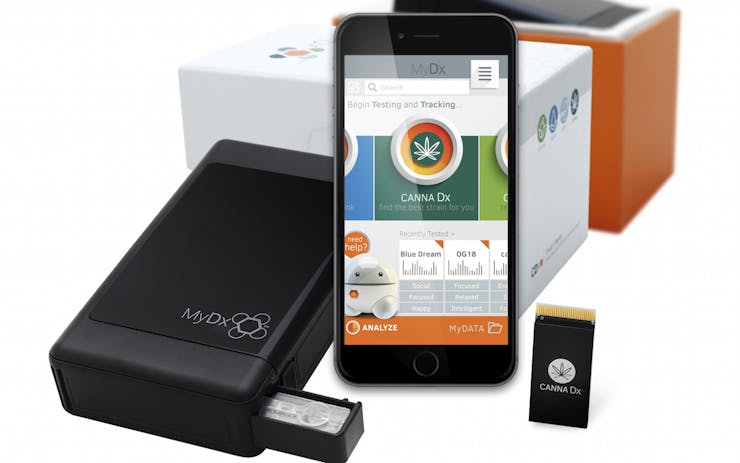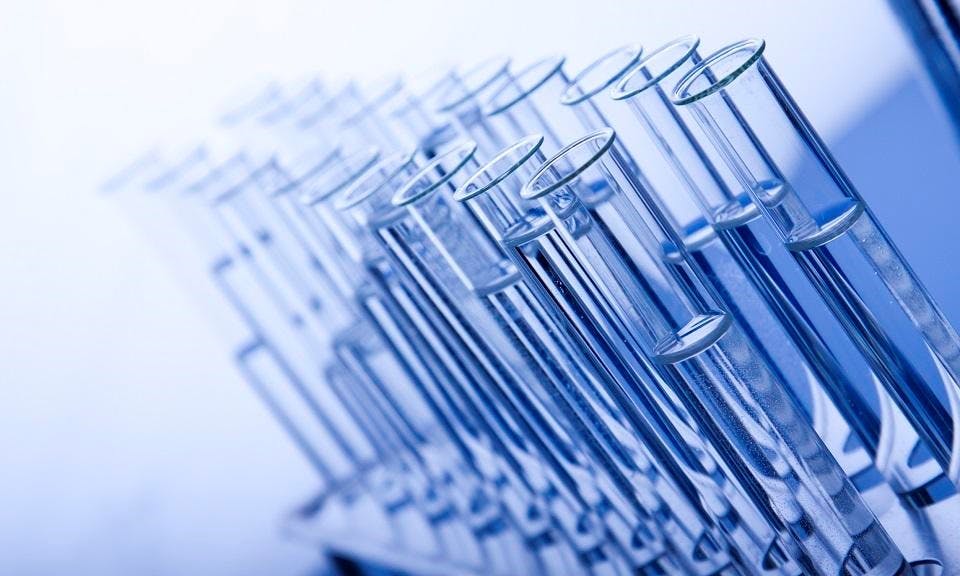Daniel Yazbeck pinches the end of a pre-rolled joint, pushing a Tic-Tac–sized crumb of cannabis out of the end. He slides open a port on a handheld plastic device called the MyDx analyzer, loads the sample inside, and, three and a half minutes later, we know nearly everything about it except the name of the grower.
Inside the device, a series of sensors known as an “electronic nose” did their thing, using technology developed by NASA’s Jet Propulsion Lab to detect chemicals in space to analyze the flower’s content of THC, CBD, CBN, THCa, and CBDa cannabinoids as well as more than 20 terpenes. “You’re sniffing it,” says Yazbeck, the founder and CEO of the San Diego-based CDx Inc. and a former scientist at Pfizer.
Pesticides are a growing concern, and it’s impossible to ignore impurities and residual solvents like butane or hexane used in extraction.
The Bluetooth-enabled, battery-powered analyzer beams the results to a smartphone app (available for iPhone and Android). Its interface shows you the sample’s chemical profile, tells you which strains it resembles, how it might make you feel, and the symptoms it may relieve. After you consume the cannabis, you can track how it actually made you feel so that you’ll have an idea of whether future samples will relieve your insomnia, glue your behind to the couch, or what. You now have a profile for that sample which can be looked up later, printed, or shared on social media.
“Every sample generates a unique fingerprint,” Yazbeck explains. “There’s no other tool that will do all this.”
At $699—which includes the MyDx analyzer, a cannabis-specific sensor, and the smartphone app—the device isn’t cheap. But it beats the $50,000 price tag on lab equipment normally used for analysis. “It’s a no-brainer for the investment,” says Yazbeck, a slight, bearded, energetic man. After all, MyDx could prove handy to more than just patients and recreational consumers. It could be a convenient part of business for growers, dispensary owners, distributors, and cannabusiness operators at every level.
The analyzer’s focus on chemical composition means it can’t identify a strain definitively. But knowing it’s Banana Kush is probably less useful than knowing that particular sample’s true makeup, anyhow. “We don’t believe in names, we believe in chemical profiles,” Yazbeck says.
Detecting cannabidiol (CBD) is a current weakness in the product, Yazbeck points out: In its current version, the sensor cannot detect more than 1 percent of CBD in a sample. Even if the content is higher, the reading will max out at 1 percent. That could be frustrating for some consumers, especially medical patients who rely on CBD for treatment.
Though the cannabis sensor (a removable “nose”) is warrantied for just six months, Yazbeck says he’s seen them last longer than three years and 3,000 tests. “If there’s a problem, we typically replace the sensor,” itself a $69.95 part, he says.

The MyDx smartphone app generates a chemical fingerprint for each cannabis sample, even suggesting similar strains. (Image courtesy of CDx Inc.)
Cannabis profiles are just one of the analyzer’s functions. Pop in a different sensor and you’ve got another electronic nose capable of sniffing out the purity of water, the composition of air, or contaminants on organic produce. But let’s stick with cannabis, because you’re wondering the following: What about pesticides? Heavy metals?
And can this thing test concentrates?
Amazingly, the answers are yes, yes, and yes. As savvy consumers know, there’s more to worry about than potency or picking the right strain. Pesticides are a growing concern, and it’s impossible to ignore impurities and residual solvents like butane or hexane used in extraction. Because, “Mm, smells like blueberries and… propanol,” is not a review you’re looking for.
“That’s the whole point of the product,” says Yazback, “to empower consumers to trust and verify what they put into their body.”
(Despite the confusing array of product names on the company’s site, the gear is simple: The analyzer accepts a different sensor each for cannabis, air, water, and organic matter. Each sensor, except the one for cannabis, which is included, sell separately for $69.95.)
Slap in the OrganaDx sensor, and you’re equipped to test cannabis — or a strawberry, for that matter — for pesticides and heavy metals. The app will give the sample (analyzed by a different means than the electronic nose) a “pass” or “fail” only. And yes, you’ll need to shell out for a separate sensor if you want to analyze for pesticides and heavy metals; that feature isn’t included in the included cannabis sensor.
The air sensor, AeroDx, is the ticket for sussing out pure extracts of any consistency, such as rosin or shatter. The analyzer displays the content of volatile organic compounds, though it doesn’t break down the results into specific VOCs.
Here’s where growers may drool: The air sensor can detect temperature, humidity, and carbon dioxide content, letting cultivators know when it’s time to harvest and turning what used to be a full-on lab test into a minutes-long task via handheld device.
“For a grower, it’s a must,” Yazbeck says.
What it delivers in convenience, the MyDx lacks in firepower; the device, is “not more accurate” than full-on lab tests, as Yazbeck puts it. “We sacrifice accuracy for simplicity and ease of use to consumers. The labs will typically always be more accurate than handheld secondary tools.”
The analyzer also can’t do edibles—so don’t expect to squish a gummy bear inside and get an accurate reading.
On its site, MyDx posts (unpaid, unsponsored) user reviews from social media and its online store. One user, Francis Janik, posted that “We compared the results from the DX to gas chromatography and found it to be very close.”
Another user, Patrick King, commenting on Facebook, wrote: “The reports and informative information on the app is WAY more than you get with your local lab reports.” King added that he compared MyDx results to standard lab tests and found the results “within 10 – 15% accuracy of lab reports.”
Not everyone is sold, though. The reviewer in this video, despite being optimistic about the device’s potential, felt that it “falls short.” That assessment was based on a discrepancy between results for THC and terpenes she obtained from the MyDx compared with those from a dispensary. The THC results varied by three percentage points.
Last quarter, the company reported $280,000 in sales. Yazbeck estimates nearly half of that came from commercial growers, with the remaining half split between dispensaries, consumers, and home growers—an indication of just who might find the product most useful.
Unless technology improves dramatically (we’re looking at you, NASA!) the MyDx is not likely to replace standard lab tests, but could offer pretty remarkable results to anyone who doesn’t have space in their living room for a $50,000 home lab—or doesn’t have the time or cash for those tests.






